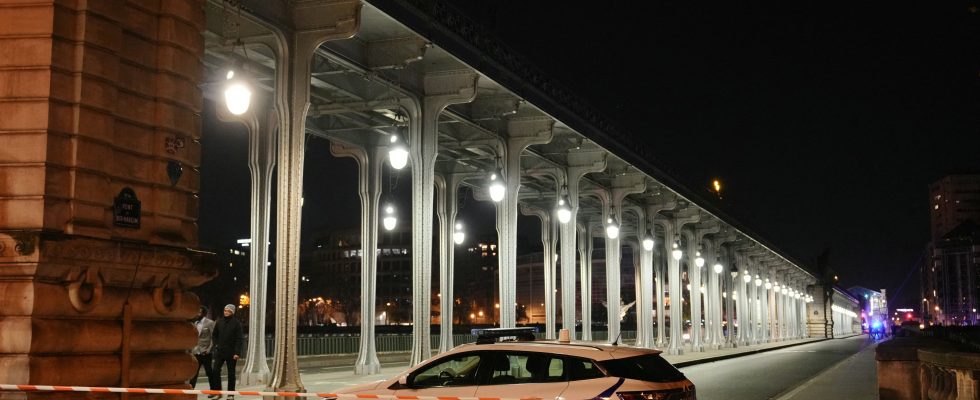How to deal with radicalized people? This Wednesday, December 6, the main psychiatric organizations which operate in the judicial field warned in a press release against numerous “amalgamations and confusions” against their profession since the attack in Bir-Hakeim which left one dead on Saturday December 2 in Paris. The attack was perpetrated by an assailant monitored for psychological disorders, and described as a “psychiatric failure” by Interior Minister Gérald Darmanin on Monday.
This charge, by emphasizing the possible responsibility of psychiatry in these cases of religious and political fanaticism, continues to provoke anger among specialists. “If certain mental illnesses can in rare cases give rise to violence linked to radicalization, the two phenomena are most of the time disjointed”, recalls Jean-Louis Senon, psychiatrist criminologist at Poitiers University Hospital, who participated in the writing of the experts’ response to the minister. Explanations.
L’Express: Why did the position of the Minister of the Interior provoke such a reaction from the psychiatric profession and what “confusions” are you talking about?
Jean-Louis Senon: Contrary to what we heard in the public debate following the terrorist attack in Bir-Hakeim, radicalization and mental illness do not overlap, except in very rare exceptions. Moreover, apart from specialists who work on populations in relation to justice, such as in detention for example, psychiatrists in open environments hardly see these profiles in their offices and would be very helpless in the face of their radicalism.
“Except for exceptions” ? When can mental illness lead to radicalization?
This is the case with certain schizophrenic psychoses, for example. The changes in beliefs and thoughts induced by schizophrenia will make the person believe that they are being persecuted. The latter may then think, depending on the context and the social environment in which they find themselves, that there are political motives behind them, such as hatred of Islam, and become radicalized in response. Many schizophrenic delusions have political or religious components.
How is psychiatric care carried out in these cases?
In these cases, the person being monitored will be offered antipsychotic treatment. On average, paranoid delusions that include themes of radicalization fade very quickly, in about three weeks. A care injunction can be issued by decision of the State representative after medical advice, or by a judge.
Are you saying that this is a rare case? The Minister of the Interior, Gérald Darmanin, however, assures that it is common…
The figure put forward by Gérald Darmanin does not correspond to medical reality. According to the Minister of the Interior, 30% of people followed for radicalization present “psychiatric disorders”. This figure is taken from intelligence and is based on elements collected by investigators, and not on a medical diagnosis.
According to all international studies, the prevalence of psychiatric disorders among radicalized subjects who commit terrorist acts is approximately 3 to 6%. According to data communicated by the prison administration in 2020, only 8% of people incarcerated for acts of terrorism have psychiatric disorders.
Don’t you have to have mental disorders to attack random people in the street?
Unfortunately, any of us can find ourselves in a situation where we attack with homicidal violence. I recently dealt with a case involving multiple stabbings and strangulation. The person did not present any mental illness. She had simply given in to her resentment, and settled her family scores. Take the settling of scores in Marseille: we observe incredible violence, increasingly young people, but very rarely with psychiatric components.
In reality, what makes a person act out and how they do it is not a matter of psychiatry except at the margins. Of course having problems doesn’t help. They can explain certain elements. The psychological analysis of the functioning of the radicalized person can also prove interesting. We often find among these people dilapidated families, the absence of a father, intra-family conflict, a lack of recognition, and extremely poor narcissistic identification (Editor’s note: little self-esteem). But these characteristics are common to many people.
But what makes an individual turn to jihadism rather than delinquency?
We must look at the way in which the family relates to the rest of society. In radicalizations, we see extremely isolated families, without access to sport or school apart from its compulsory nature. Family isolation is a major component. Depending on the various orientations of this environment, the individual, especially if he is young, can then be exposed to radical political and religious ideologies and have bad encounters which will contribute to radicalizing him. The young person joins because he gets listening and appreciation that he did not have until now.
Psychiatrists can participate in the response to radicalization by offering an analysis of the psychological functioning of the individual or by treating related psychological conditions such as depression, which, if they are not responsible for the radicalization, can delay the appeasement or repentance. But it is above all a social phenomenon. It is therefore difficult to provide a psychiatric response. It does not seem the most judicious to me at first glance, especially since due to distrust of authority, radicalized profiles are very difficult to approach on this level. This is also partly why the deradicalization centers have not worked.
.
